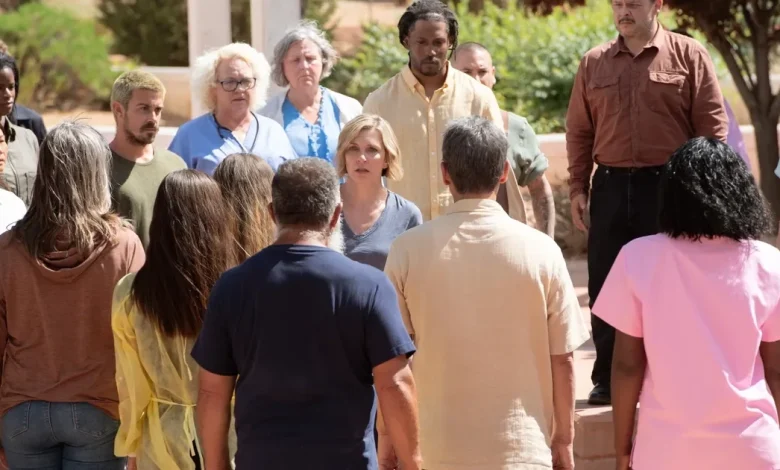‘Pluribus’ Episode 4 Recap: Weirdly Honest

Pluribus
Please, Carol
Season 1
Episode 4
Editor’s Rating
In her quest to learn more about how the collective’s mind operates, Carol exposes herself to some harsh truths.
Photo: Apple TV
Two years ago, Nicole Holofcener, the writer-director of funny and incisive indie comedies like Walking and Talking and Lovely & Amazing, released another great movie, You Hurt My Feelings, starring Julia Louis-Dreyfus as Beth, a successful memoirist and creative-writing teacher who’s having trouble finishing her first novel. Her agent thinks it needs work, but she has enjoyed the steadfast support of her husband (Tobias Menzies), who goes so far as to suggest that she find another agent who might be more enthusiastic about it. Then one day, she overhears her husband confessing to his brother-in-law that he doesn’t really like the book but can’t bring himself to tell her. Needless to say, Beth is devastated to hear this. The title You Hurt My Feelings is unfair in the sense that Beth’s husband was always careful to spare her feelings by not being honest about how he really felt about her work. He only hurt her by accident, which gives Holofcener a chance to ruminate about the value of honesty in a loving relationship and whether the people closest to us need to know what we really think about everything. What does support really mean? Should it only be about encouragement? Or is a little candor important, too?
If there was ever any question about Carol’s commitment to saving humanity, it’s put to rest this week with her willingness to learn what Helen, the woman she loved and respected most in this world, actually thought of her work. We have witnessed Carol’s willingness to make herself uncomfortable on principle, whether by sitting in coach when first class is open or by tossing re-creations of her all-time-favorite meals in the garbage. But to invite painful truths about herself as a writer, as she does in one of the two most affecting scenes in this extraordinary episode, is like sticking her face in a fan. She starts out wanting to learn something about the Others and how their collective minds operate, but ends up cracking open Pandora’s box.
After another ingenious cold open — more on that in the bullet points — Pluribus picks up where the last episode left off, with Carol leaving a wounded Zosia to recover at the hospital and driving a police cruiser home. (She doesn’t want to talk to the Others at this moment, which flummoxes them enough to where they assume she doesn’t know how to use a CB radio. “Works just like on Adam-12. Remember how you used to love that show?”) Arriving to a crew of Others, including the mayor, tidying up the broken glass and shrapnel on her property, Carol beelines to a whiteboard that’s currently filled with ideas for the fifth novel in her Wycaro trilogy. Giving herself a fresh board, Carol starts to organize her thoughts on “What I Know About Them” in an effort to puzzle out a possible weakness. She decides that the question mark on her fifth entry, “weirdly honest?,” needs to be resolved.
Calling in one of the Others, a typically sunny gentleman in bicycle shorts named Larry (a perfectly cast Jeff Hiller), Carol starts simply by asking the collective if they like her books. The conversation around that question isn’t about honesty so much as it’s about what the Others value. “Your books are an expression of you,” says Larry. “And we love you.” Okay. Pressed further, they love the plot turns and character arcs, and can recite from memory a flowery passage about a gown in one of her Wycaro books. Then they put her work on a level with Shakespeare, which is absurd to her but revealing, in that the quality of the writing itself is rendered meaningless when compared to the fulfillment it provides. Carol is apoplectic about how stupid it is for a Wycaro book to be considered equally good to Romeo & Juliet just because it helped bring some contentment to people like Moira from Kansas City. But she’s pained to learn that Helen loved the life her best sellers provided while thinking the actual books were like “cotton candy.”
With that, Carol sticks her face in the fan for mankind. She gives Larry “special dispensation” to tell her what Helen really thought. “If you tell me,” she says with heartbreaking resolve, “it’ll make me happy.” Carol can accept that her Wycaro series is mercenary pablum, but what about Bitter Chrysalis, the unpublished novel that’s as sincere a stab at greatness for her as Beth’s debut novel is in You Hurt My Feelings? Carol learns that Helen thought it was “meh,” that she stopped reading this 489-page tome three paragraphs into page 137, and that she and her agent agreed that it wouldn’t hurt Carol’s career to put it out into the world. The Others are honest. Carol can now remove that question mark and figure out how to exploit them for it. She also has to contend with the fact that her favorite person didn’t think much of her work and that even at her best, she’s a mediocrity as a writer.
With this new insight in hand, Carol brushes herself off and heads back to the hospital to visit Zosia and ask her directly if there’s any way to reverse the Joining. Zosia’s inability to lie and say “no” tells Carol what she needs to know, but Zosia’s insistence that Carol will “understand everything” once she’s been brought into the fold sticks in her craw. The notion of surrendering herself to a collective “normal” triggers the core trauma of Freedom Falls, the “conversion therapy” camp in Tennessee, where she was sent after her mother found out she was queer. “Some of the worst people I have ever known,” she tells Zosia, “and they smiled all the time, just like you.” For Carol, the notion of surrendering herself for the promised bliss of normalcy is revolting. Maybe there’s something different about the form of acceptance that Zosia is offering, but it can’t be trusted.
Carol’s scheme of using Pentothal, which she pilfers from the hospital pharmacy under the guise of seeking heroin, to pull more information about the Joining out of Zosia leads to a spectacle that exposes the Others as vulnerable when asked to defy their own collective values and sense of self (or selves). Being coerced to speak against their will is not on a level with what happened to Carol at Camp Freedom Falls, because we don’t know anything about who the Others are and what they want, or even whether it’s a good idea to try to stop them. But Zosia’s tears, and those of the hospital staff and patients who gather around her, as she collapses into cardiac arrest speak to their vulnerability as much as E.T.’s when he’s being probed by scientists. Are Carol and the Others enemies? Or are they not understanding each other? Stay tuned …
• Another excellent cold open introduces us to a new major character in Manousos (Carlos Manuel Vesga), who’s treating this situation like a true alien invasion, holing himself up in the office at a storage facility while refusing any interaction with the Others. With respect to Carol, refusing first class is one form of resistance, but licking the lid of a tin can from the garbage is another level of commitment. For this scene with Manousos to overlap with Carol’s effort to reach out to him from the previous episode is a clever touch, because we can see that her third call signals hope for him. The Others would not tell him to go fuck his mother.
• Kudos to the show for treating Pentothal as the complicated anesthetic that it is, rather than a device for extracting the truth like Wonder Woman’s lasso. It’s funny that, after watching a lot of footage of herself yammering incoherently under the medication’s influence during her test run, Carol finds her own admission of Zosia’s fuckability to be the most convincing evidence that she’s on to something.
• This episode was written by Alison Tatlock, one of several writers Vince Gilligan has brought over from Better Call Saul, for which she’s credited with five episodes. But Tatlock deserves mention here because she was also the writer of three episodes of Halt and Catch Fire, one of the most criminally underappreciated series of this century. Go watch it if you haven’t already.
• Gilligan’s interest in obsessive personalities — mirrored by the meticulousness of his shows, of course — now gives us Carol’s whiteboard and Manousos jotting down radio frequencies. You just know these two would happily spend an evening piecing together shredded invoices from a shady retirement home!
• It’s worth pausing to see some of Carol’s ideas for the next Wycaro book: “Raban dies (Again?) — THIS TIME FOR REAL?!?,” “sand flood,” “LOVE POTION!,” “the Cliffs of Chartreuse.”
• This will be worth talking about more in future episodes, but the contrast between Manousos and Carol’s engagement with the Others is meaningful. While Carol realizes that she’s being manipulated by Zosia, a manifestation of the Others tailored specifically for her, she nonetheless shows her some sympathy at times, like when she helps the wounded Zosia open a carton of milk at the hospital. Zosia is an Other that she’s not 100 percent seeing as an Other.
• “Fun fact: The police officer who drove that vehicle, his son’s third-grade teacher’s husband’s sister was a chartered member of the Wycaro fan club.” “Wow. Chills.”
• The show remains extremely funny, e.g., the scene where Carol gets caught raiding the pharmacy and asks the pharmacist for some heroin and hypodermic needles: “I’m gonna Sid Vicious this shit like it’s the Chelsea fucking Hotel.”
VULTURE NEWSLETTER
Keep up with all the drama of your favorite shows!
Vox Media, LLC Terms and Privacy Notice





